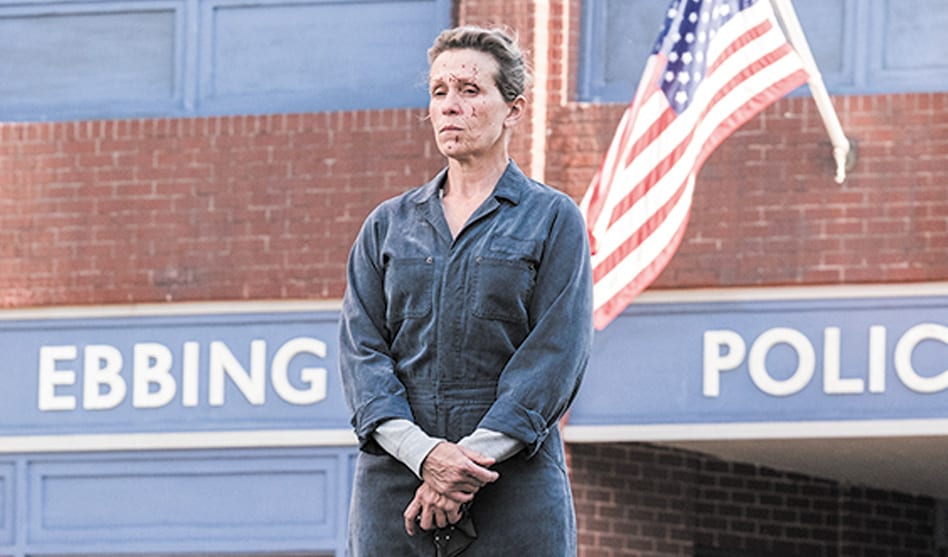Three Billboards Outside Ebbing, Missouri. Martin McDonagh’s artistic output amounts to eight produced plays (most written in a year-long frenzy of creativity more than 20 years ago), two feature films and one short (which won him an Oscar). Yet with that slender resume he has become a genre in himself. It’s not just that McDonagh has finely honed the concept of the dark comedy, it’s that the comedy is both riotous and inappropriate; the darkness pitch-black and morally ambiguous. Often he sets his works in Ireland, where abiding weirdness is not only commonplace but noticeable for its absence; he has a touch of the blarney, and his tall tales are both shockingly outrageous but oddly believable.
He refocuses his sights toward the American Midwest with this, his third feature, and this time the trigger of the plot isn’t his characters’ peculiar preoccupations with pets (a shi tzu in Seven Psychopaths; a cat in The Lieutenant of Inishmore) or even a phantom limb (A Behanding in Spokane), but more human: a teenaged girl, brutally, horrifically raped and murdered several months before the story begins. The girl’s mother, Mildred (Frances McDormand, coasting toward another Oscar nomination) has become displeased with how the local police chief (Woody Harrelson) has stalled the investigation, and rents three billboards all but accusing him of misfeasance. This provocative act galvanizes the community, who support the chief, rumored to be dying of cancer. Deputy Dixon (Sam Rockwell) takes especially offense and exacts his own form of revenge and disobedience, but Mildred is unswayed in her fierceness.
It would be nice to say that Three Billboards resolves itself when the corrupt chief is ousted or the deputy is revealed to be the real killer, but neither of those things are true. In fact, nothing goes according to plan, even the plan you might have in your head when the action starts. Mildred’s maternal passion is understandable, but in her steadfastness she can’t see her own errors, her own lack of empathy; the chief turns out to be a conscientious good guy trapped by circumstances; and so on. Nothing is as two-dimensional as a billboard, especially in McDonagh’s universe.
The reason the film works so well is not that it tells a mystery you can’t wait to uncover, but because it is fueled by detailed character work and unexpected choices. Midway in, Harrelson delivers a narration as perfectly modulated and emotionally destroying as anything he’s ever done; Rockwell, who devolves quickly into a shtick of arrogantly weaselly assholes eventually uncovers the humanity in his character and reminds us why we first started watching him in the first place. Indeed, everyone in the cast, from Peter Dinklage to Lucas Hedges to John Hawkes, hits their marks.
But can you imagine any actress but McDormand having the cool-eyed ballsiness to grimace and smirk and swallow her feelings with more controlled rage? She’s a marvel in the right role, a character actress who falls into leading roles when the time is right and transforms our perceptions. Three Billboards is dire, but alternatively hilarious and astonishing, though never unhopeful. In other words, it’s what I love about the McDonagh genre.
Wonder. Sneak a peek at the trailer of Wonder, or read a synopsis, and you’ll know what you’re gonna get… and you’ll get exactly that: Ten-year-old Auggie (Jacob Tremblay of Room) was born with a cranial deformity that makes him look freakish. Until now, his loving parents (Julia Roberts, Owen Wilson) and his sister Via (Izobela Vidovic) have supported and tended his needs, but it’s time for him to enter school and learn to adjust to the larger world… which, of course, includes bullies. Say it with me: Heart. Warming. Treacle. Well, kinda, but excellently so. Director/co-writer Stephen Chbosky (The Perks of Being a Wallflower) knows something about extracting beautiful moments from admittedly manipulative fodder by not overplaying, but letting the humanity and complexity of a situation play out. He does it by not so much tugging at your heartstrings as plucking them lightly. Tremblay is a talented young performer who conveys a lot under tons of makeup, and Noah Jupe, who held his own with Matt Damon and Julianne Moore in the underappreciated Suburbicon, establishes himself as a sensitive actor as well playing Auggie’s one ally at school. The film doesn’t break new ground, perhaps, but it does give you someone to root for. And it’s just nice seeing Owen Wilson in a movie about someone with an asymmetric face and it’s not about him.
— Arnold Wayne Jones

